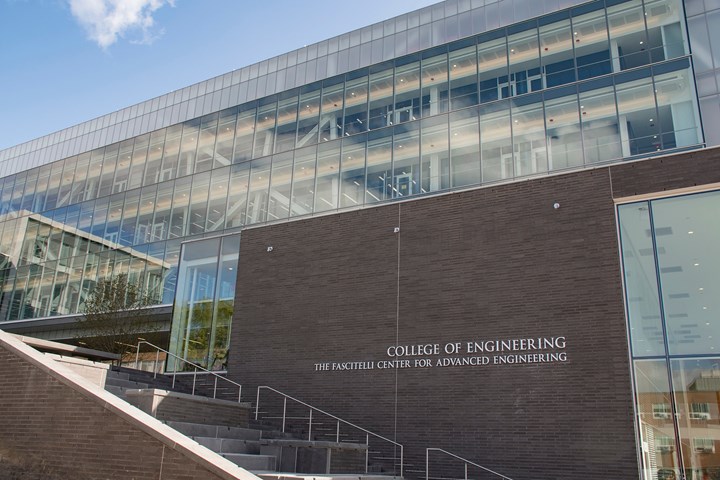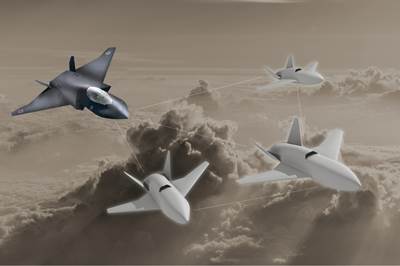401 Tech Bridge announces winners of first Materials Innovation Challenge
Funding will enable innovators at Canapitsit Customs LLC, Nautilus Defense and TxV Aerospace Composites to connect to academic resources including research, validation and testing.

The University of Rhode Island (URI) College of Engineering. Photo Credit: 401 Tech Bridge
401 Tech Bridge (Portsmouth, R.I., U.S.) announced on Dec. 15 Rhode Island-based Canapitsit Customs LLC (Bristol), Nautilus Defense (Pawtucket) and TxV Aerospace Composites (Bristol) as the winners of the company’s Materials Innovation Challenge, which connects innovators to academic resources to accelerate the development of advanced composite materials and technologies.
401 Tech Bridge will provide $105,000 ($35,000 per project) to the University of Rhode Island (URI) College of Engineering. Project funding will support collaboration with URI’s Dynamic Photomechanics Laboratory—led by Mechanical, Industrial and Systems Engineering Professor, Arun Shukla and Assistant Professor, Helio Matos—and its Multiscale and Multiphysics Mechanics of Materials Research Laboratory—led by Assistant Professor of Civil and Environmental Engineering, Sumanta Das—on modeling, research testing and validation projects.
“401 Tech Bridge is excited to further the innovative work of Canapitsit Customs LLC, Nautilus Defense and TxV Aerospace Composites by connecting them to URI, which is known nationally for its advanced materials research,” says Mary Johnson, manager, 401 Tech Bridge. “The Materials Innovation Challenge helps these companies enhance their internal R&D capabilities with support from the university, creating new solutions and business opportunities.”
The 401 Tech Bridge Materials Innovation Challenge was formed to address the fact that while large companies have internal R&D labs, the small organizations that make up the bulk of the region’s advanced materials businesses do not. 401 Tech Bridge has collaborated with these small businesses to identify the expertise and tools they need to develop their ideas into new solutions, working with the URI Business Engagement Center to connect them with the faculty and facilities that could help.
“This is an excellent opportunity for us here at URI to get involved with applied research projects and help the local industry,” sa Arun Shukla, PhD, Department of Mechanical, Industrial and Systems Engineering at URI. “With collaboration between our Dynamic Photomechanics and Multiscale and Multiphysics Mechanics of Materials Research laboratories, synergistic application of experiments and computational modeling in these projects will accelerate the design and development of transformative high-performance composite materials for multifunctional applications.”
Through programs like the Materials Innovation Challenge, 401 Tech Bridge helps open pathways for companies that are developing leading-edge advanced materials, technologies and products.
Canapitsit Customs LLC is a woman-owned small business that specializes in composites design and manufacturing for the marine, defense and aerospace industries. Support from the Materials Innovation Challenge will enable Canapitsit Customs to work with URI to develop, simulate and validate the company’s design and manufacturing processes for a deep-sea pressure vessel that has significant potential in the defense, renewable energy and offshore oil and gas sectors.
“The support from the Materials Innovation Challenge will enable us to continue the development of a deep-sea composite pressure vessel, providing extended mission capabilities and increased payload capacity for unmanned underwater vehicles (UUVs),” says Darya Blout, founder and owner, Canapitsit Customs LLC. “Using the expertise of both URI’s laboratories, we hope to develop an economic vessel that will allow for the integration of advanced materials to be feasible for an increased number of UUV developers and manufacturers.”
Nautilus Defense is a small business that is focused on the development and production of textile-integrated systems for monitoring high-value assets and their environments. Materials Innovation Challenge funding will enable Nautilus to perform electromechanical testing of novel textile-integrated systems, which will help to strengthen the company’s offerings to the defense and commercial markets.
TxV Aerospace Composites is a manufacturer of composite parts and assemblies for the aerospace industry. The company provides composite solutions that save cost, reduce weight and allow for faster production of aircraft components, made possible by a novel material and process that enables the manufacture of parts in minutes versus the hours it could take with traditional materials and manufacturing. With URI funding, the company plans to characterize the strength and behavior of material bondline and correlate that data to the performance of hybrid composite structures.
“Our novel hybrid overmolding process combines the strength of continuous fiber composites and the functionality and flexibility of injection molding to create aerospace parts efficiently. The interface bond of these two materials is critical for final part performance, and this research will enable us to quantify the mechanical performance and will help to further drive market adoption of the technology,” says Peter Levesque, engineering manager, TxV Aerospace Composites.
The 401 Tech Bridge Materials Innovation Challenge is supported by the NIST MEP, the University of Rhode Island Business Engagement Center, the University of Rhode Island College of Engineering and the University of Rhode Island Research Foundation.
Read Next
401 Tech Bridge completes $6 million funding round
The U.S. Economic Development Administration grant will help support construction of an Advanced Materials and Technology Center in Portsmouth.
Read MoreNCC, Dstl facilitate R&D program for combat aircraft composite structures
The partnership invites organizations to pitch their most innovative ideas and capabilities to influence the direction of the ADCoSCA research program.
Read MoreAll-recycled, needle-punched nonwoven CFRP slashes carbon footprint of Formula 2 seat
Dallara and Tenowo collaborate to produce a race-ready Formula 2 seat using recycled carbon fiber, reducing CO2 emissions by 97.5% compared to virgin materials.
Read More




















